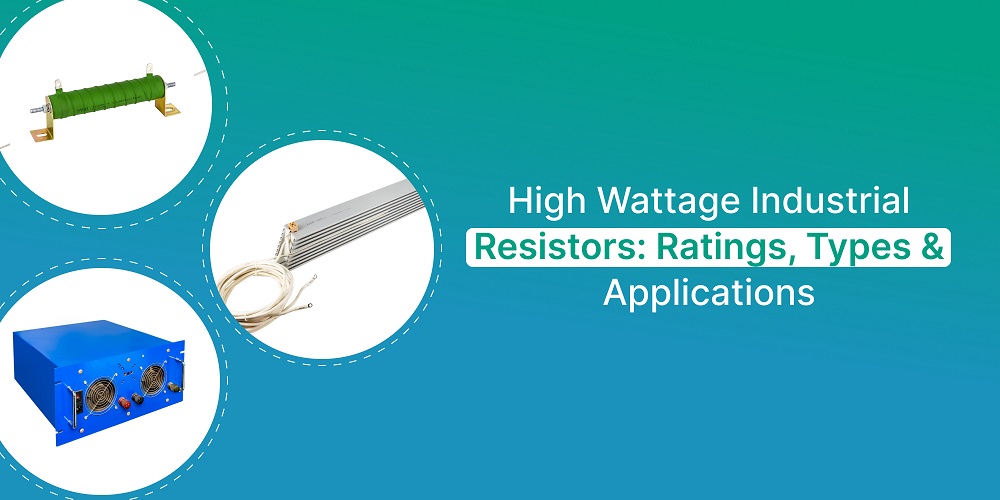
High Wattage Industrial Resistors: Ratings, Types & Applications
When it comes to heavy-duty electrical applications, choosing the right resistor is one of the most important decisions. In industries such as power generation, manufacturing, railways and automation, equipment often operates at very high current and voltage levels. This is where High Wattage Industrial Resistors play a critical role. They are designed to handle high electrical loads safely, ensuring both performance and protection of expensive machinery.
At Cermet Resistronics, we understand how vital these components are in industrial operations. As a manufacturer, we provide high quality resistors that meet global standards and deliver long-lasting reliability. In this article, let us look at the ratings, types and applications of high wattage resistors for industrial use in simple terms.
What Are High Wattage Industrial Resistors?
Resistors are basic yet essential components used to control current flow in any electrical circuit. A standard resistor is suitable for small-scale or consumer electronic devices. But in industries where machines and systems operate at large power levels, ordinary resistors cannot withstand the load.
This is why High Wattage Industrial Resistors are specially built to dissipate high amounts of heat and manage heavy electrical stress. They are made with robust materials, larger surface areas and advanced designs to ensure consistent performance even under continuous operation.
Understanding Resistor Ratings
Every resistor comes with specific ratings that indicate how much electrical energy it can handle. While choosing high wattage resistors for industrial use, it is important to look at the following parameters:
- Power Rating (Wattage):
This shows how much power the resistor can dissipate as heat without damage. In industrial settings, resistors may range from a few watts to several hundred watts, depending on the requirement. - Resistance Value (Ohms):
The resistance value decides how much current will flow through the circuit. Choosing the right resistance ensures stability and safety in machines. - Tolerance:
Tolerance defines how close the actual resistance is to the specified value. In industries, precision resistors are often required to maintain accuracy. - Temperature Coefficient:
Since resistors heat up during operation, this rating indicates how the resistance value changes with temperature. A stable resistor ensures reliable performance.
When engineers select High Wattage Industrial Resistors, these ratings guide them in choosing the correct component for a particular application.
Types of High Wattage Industrial Resistors
Industrial requirements vary from one sector to another. To meet these diverse needs, different types of resistors are used. The most common ones include:
- Wire Wound Resistors:
Made by winding metal wire around a ceramic core, these resistors can handle high power and are widely used in heavy duty applications. - Metal Oxide Resistors:
Known for their high surge capability and durability, they are suitable for power supplies and motor control. - Braking Resistors:
These are specifically used in electric drives and railway systems to absorb excess energy when motors slow down. - Load Bank Resistors:
Used for testing and maintenance of power systems, these resistors can simulate real-world electrical loads.
Each of these high wattage resistors for industrial use is designed with a specific purpose. Choosing the right type depends on the machinery and the operating conditions.
Applications of High Wattage Industrial Resistors
The use of High Wattage Industrial Resistors is spread across multiple industries. Some of the most common applications include:
- Motor Control and Drives:
Resistors regulate the speed and torque of large motors, preventing sudden surges. - Power Distribution:
In substations and large power networks, resistors help in load balancing and energy dissipation. - Railway Systems:
Braking resistors are used in locomotives and metro systems to safely absorb energy during deceleration. - Industrial Automation:
Machines in factories require controlled energy flow, which is achieved by using high wattage resistors for industrial use. - Testing and Maintenance:
Load banks with resistors help in testing generators, UPS systems and other power equipment under controlled conditions.
Why Choose Cermet Resistronics
For over three decades, Cermet Resistronics has been a trusted name in providing reliable resistor solutions to industries across India. As a manufacturer, we ensure that our High Wattage Industrial Resistors are manufactured using high grade materials, tested for durability, and compliant with international quality standards.
Our wide range of resistors caters to different industrial needs, whether it is for heavy machinery, railways, or automation systems. By working with us, businesses can be assured of:
- Consistent quality and reliability
- Products customised to application needs
- On-time delivery across India
- Technical support for selection and usage
Conclusion
In industries where machines and systems operate under heavy loads, choosing the right resistor is essential for safety and efficiency. High Wattage Industrial Resistors are designed to meet these demands, offering durability, accuracy and reliable performance. From motor control to railway braking systems, their applications are vast and critical.
At Cermet Resistronics, we take pride in being a manufacturer that provides the best high wattage resistors for industrial use. With our expertise and commitment to quality, we continue to serve industries with solutions that power growth and innovation.

